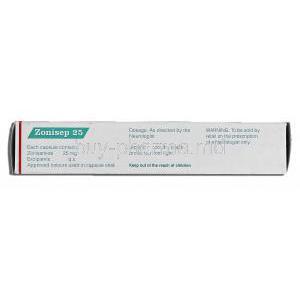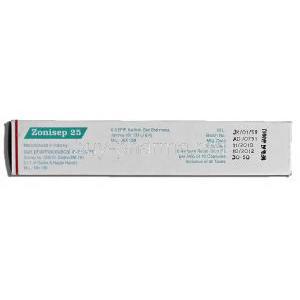Introduction to Zonisep (Zonisamide)
Zonisep, containing the active compound zonisamide, is a potent anticonvulsant prescribed for the management of seizure disorders. It belongs to the sulfonamide class of medications and is recognized for its broad-spectrum efficacy in controlling abnormal neuronal firing patterns. Zonisep has been incorporated into epilepsy treatment protocols worldwide due to its unique pharmacological profile.
This medication is classified as an antiepileptic drug (AED) within the therapeutic group of central nervous system agents. Its development traces back to Japan in the late 20th century, with subsequent regulatory approvals in various countries, including the United States and parts of Europe. It is marketed both under the brand name Zonisep and as generic zonisamide, providing wider accessibility for patients requiring long-term seizure control.
Composition and Formulation
The primary active ingredient in Zonisep is zonisamide, a sulfonamide derivative. It is available in oral capsule form, commonly in strengths such as 25 mg, 50 mg, and 100 mg, allowing for flexible dosing regimens tailored to individual patient needs.
Inactive components, which may vary by manufacturer, often include microcrystalline cellulose, sodium lauryl sulfate, and gelatin in capsule shells. These excipients are formulated to ensure stability, absorption efficiency, and patient tolerability. Zonisep is typically packaged in moisture-resistant blister packs or high-density polyethylene bottles to maintain potency throughout its shelf life.
Mechanism of Action – How Zonisep Works
Zonisep exerts its therapeutic effects through a multifaceted mechanism:
- Voltage-gated sodium channel modulation – reduces repetitive neuronal firing by stabilizing hyperexcitable membranes.
- Inhibition of T-type calcium channels – disrupts abnormal thalamic activity linked to certain seizure types.
- Carbonic anhydrase inhibition – alters pH balance in neural tissues, contributing to its antiepileptic effects.
- Neuroprotective influence – potentially limits excitotoxicity and oxidative stress within neuronal networks.
This multimodal action makes Zonisep effective across a variety of seizure patterns, including those resistant to monotherapy with other AEDs.
Approved Medical Uses
Zonisep is officially indicated for:
- Partial-onset seizures in adults – either as monotherapy or in combination with other AEDs.
- Adjunctive therapy for refractory epilepsy – enhancing seizure control when primary treatments are insufficient.
- Generalized seizures – approved in certain jurisdictions where clinical trials have demonstrated benefit.
Off-Label Uses
Beyond its approved indications, Zonisep has been explored in several off-label contexts:
- Migraine prophylaxis – reducing attack frequency in chronic migraine sufferers.
- Neuropathic pain management – alleviating pain syndromes resistant to standard analgesics.
- Bipolar disorder – adjunctive mood stabilization in refractory cases.
- Weight management – as part of combination regimens targeting obesity.
- Movement disorders – investigational use in Parkinson’s disease and essential tremor.
Dosage and Administration
Typical adult dosing for epilepsy begins at 100 mg daily, with gradual titration to an effective maintenance dose, often between 300–500 mg per day. Titration schedules aim to minimize adverse reactions while optimizing seizure control.
Dosing may be administered once daily or in divided doses, depending on patient tolerance and therapeutic response. Zonisep can be taken with or without food, though consistency in administration timing is recommended for stable plasma levels.
Dosage Adjustments for Special Populations
- Elderly patients – start at the lower end of the dosing range; monitor closely for sedation, cognitive effects, and metabolic changes.
- Renal impairment – reduce dose or extend dosing intervals due to renal excretion of the drug.
- Hepatic impairment – exercise caution, adjusting dose according to tolerability and clinical response.
- Pediatric patients – dosing is weight-based, with limited approval in some regions; safety profile requires close observation for heat regulation issues.
Warnings and Important Precautions
Several serious risks warrant careful patient monitoring:
- Dermatologic reactions – rare but potentially fatal syndromes such as Stevens–Johnson syndrome and toxic epidermal necrolysis.
- Metabolic acidosis – particularly in children and patients with predisposing conditions.
- Oligohidrosis and heat stroke – risk heightened in pediatric populations and hot climates.
- Psychiatric manifestations – including depression, suicidal ideation, and psychosis.
- Kidney stones – encourage adequate hydration to reduce occurrence.
Routine hematologic and metabolic assessments are advised throughout therapy.
Contraindications
- Known hypersensitivity to zonisamide or other sulfonamide derivatives.
- History of severe allergic or anaphylactic reactions to similar agents.
- Medical conditions in which carbonic anhydrase inhibition poses significant risk, such as certain metabolic disorders.
Careful Administration Guidelines
Zonisep should be introduced gradually, allowing the body to adjust to its pharmacological effects and minimizing the likelihood of adverse reactions. A slow titration schedule can significantly reduce the incidence of dose-related side effects.
Caution is warranted in patients with a documented history of kidney stones or underlying metabolic disorders, as zonisamide may alter biochemical balance and exacerbate such conditions. Individuals with prior psychiatric illness, including depression or psychosis, should undergo comprehensive mental health evaluation before initiating therapy to assess potential risk factors.
Maintaining adequate hydration is crucial during treatment. Patients should be advised to consume sufficient fluids daily and consider dietary modifications—such as limiting excessive protein intake—to help prevent the formation of renal calculi.
Side Effects of Zonisep
Common Side Effects
Some adverse effects occur more frequently and are typically mild to moderate in intensity:
- Drowsiness, dizziness, and persistent fatigue
- Loss of appetite and associated weight reduction
- Cognitive slowing or short-term memory difficulties
- Gastrointestinal discomfort, including nausea and vomiting
Serious and Rare Side Effects
Although uncommon, certain adverse effects may be severe and require immediate medical attention:
- Severe dermatologic reactions such as Stevens–Johnson syndrome
- Hematologic abnormalities including leukopenia or anemia
- Hyperammonemia, occasionally progressing to encephalopathy
- Visual disturbances and ocular complications that may impair daily functioning
Drug Interactions
Zonisep may interact with other medications, potentially altering therapeutic effects or increasing toxicity risk:
- Concurrent use with other antiepileptic drugs such as phenytoin, carbamazepine, or valproate can modify serum concentrations and efficacy
- Metabolized primarily via CYP3A4 pathways; co-administration with enzyme inducers or inhibitors can significantly affect drug levels
- Combining with carbonic anhydrase inhibitors like topiramate or acetazolamide may increase metabolic acidosis risk
- Alcohol and other CNS depressants can potentiate sedation and impair cognitive performance
Use in Special Populations
Administration to Elderly Patients
Aging can influence drug metabolism and excretion, potentially leading to higher plasma concentrations. Elderly individuals may be more susceptible to sedation, balance impairment, and metabolic disturbances, warranting careful dose adjustment and monitoring.
Administration to Pregnant Women
Zonisep falls into a pregnancy risk category where fetal harm cannot be ruled out. Limited human data suggest potential teratogenicity; however, uncontrolled seizures during pregnancy also carry significant risks. The decision to continue therapy should balance maternal seizure control with potential fetal impact. Folic acid supplementation is recommended to help reduce neural tube defect risk.
Administration to Nursing Mothers
Zonisamide is excreted in human breast milk, which may expose nursing infants to pharmacologically active amounts. Monitoring for sedation, feeding difficulties, or developmental delays is advisable if breastfeeding is continued during therapy.
Administration to Children
Pediatric approval is generally restricted to certain seizure types and age groups. Safety concerns include reduced sweating (oligohidrosis) and increased risk of metabolic acidosis. Long-term use requires close observation for any impact on growth and neurodevelopment.
Overdose and Emergency Management
Signs of overdose can include extreme drowsiness, nausea, ataxia, seizures, and cardiac rhythm disturbances. Management is supportive, with priority given to stabilizing vital signs. Gastric decontamination—such as activated charcoal—may be appropriate if administered promptly. Continuous monitoring is recommended to detect and address emerging complications.
Storage and Handling Precautions
Zonisep should be stored at controlled room temperature, protected from moisture and direct light. Stability is best maintained in the original packaging until use. Expired or unused medication should be disposed of safely in accordance with local pharmaceutical waste regulations to prevent accidental ingestion.
Patient Counseling Points
Patients should understand the importance of adhering strictly to their prescribed dosing schedule to maintain steady therapeutic levels. They should be made aware of warning signs—such as skin rash, mood changes, or visual disturbances—that necessitate immediate medical evaluation.
Lifestyle guidance includes adequate daily hydration, caution in hot environments to avoid heat-related illness, and avoidance of abrupt discontinuation, which may precipitate seizure recurrence. Open communication with healthcare providers ensures timely management of side effects and optimization of treatment outcomes.
Zonisep, Zonisamide FAQ
- What is the use of Zonisep?
- What is the drug zonisamide used for?
- What are the side effects of Zonimid 50 mg?
- What does zonisamide do to your brain?
- Is zonisamide a high risk drug?
- What to avoid with zonisamide?
- When should I take zonisamide, morning or night?
- Does zonisamide affect sleep?
- What happens if you suddenly stop taking zonisamide?
- Can zonisamide cause memory loss?
- Is it better to take zonisamide at night or morning?
- Can I take vitamin D with zonisamide?
- Why do you need to wear gloves when handling zonisamide?
- Can zonisamide make you gain weight?
- What are the benefits of taking zonisamide?
- Can Keppra and zonisamide be given together?
- Can zonisamide affect memory?
- What to avoid while taking zonisamide?
- How long does it take for zonisamide to kick in?
- Can zonisamide be used to treat migraines?
- Is zonisamide bad for the kidneys?
- Does zonisamide affect the heart?
- Is zonisamide used for weight loss?
- Does zonisamide make you sleepy?
- Does zonisamide prevent migraines?
- Is zonisamide a mood stabilizer?
- What is the drug zonisamide used for?
- Does zonisamide affect sleep?
- Can zonisamide cause memory loss?
- Can I take vitamin D with zonisamide?
- How much water should I drink with zonisamide?
- Can zonisamide make you gain weight?
- What are the benefits of taking zonisamide?
- Can Keppra and zonisamide be given together?
- What is the normal dosing for zonisamide?
- Can zonisamide be used to treat migraines?
- Is zonisamide bad for the kidneys?
- Does zonisamide affect the heart?
- Is zonisamide used for weight loss?
- Does zonisamide make you sleepy?
- Does zonisamide prevent migraines?
- Is zonisamide a mood stabilizer?
What is the use of Zonisep?
The Zonisep 100 Capsule is basically a medication thats used to control seizures in people with epilepsy.
What is the drug zonisamide used for?
onasamide is used to treat partial-onset seizures in epilepsy.
What are the side effects of Zonimid 50 mg?
Dizziness, sleepiness, headache, diarrhea, indigestion, tiredness, confusion
What does zonisamide do to your brain?
Zonisamide is a medication that essentially slows down brain activity.
Is zonisamide a high risk drug?
Zonisamide may cause life-threatening rashes, including Stevens-Johnson syndrome (SJS) and toxic epidermal necrolysis (TEN)
What to avoid with zonisamide?
Alcohol
When should I take zonisamide, morning or night?
Night
Does zonisamide affect sleep?
Yes
What happens if you suddenly stop taking zonisamide?
Seizures may worsen.
Can zonisamide cause memory loss?
Yes
Is it better to take zonisamide at night or morning?
Evening
Can I take vitamin D with zonisamide?
Yes
Why do you need to wear gloves when handling zonisamide?
Zonisamide has a sulphonamide group, which can be a problem because this type of compound is linked to some side effects that affect the immune system.
Can zonisamide make you gain weight?
No
What are the benefits of taking zonisamide?
This medication works by targeting the central nervous system, which helps cut down on the number of seizures and makes the ones that do happen less severe.
Can Keppra and zonisamide be given together?
No
Can zonisamide affect memory?
Yes
What to avoid while taking zonisamide?
Alcohol
How long does it take for zonisamide to kick in?
2 weeks
Can zonisamide be used to treat migraines?
Yes
Is zonisamide bad for the kidneys?
It can cause kidney stones.
Does zonisamide affect the heart?
Yes
Is zonisamide used for weight loss?
Yes
Does zonisamide make you sleepy?
Yes
Does zonisamide prevent migraines?
Yes
Is zonisamide a mood stabilizer?
Yes
What is the drug zonisamide used for?
Zonisamide is used together with other medicines to treat partial-onset seizures (convulsions)
Does zonisamide affect sleep?
It improves sleep.
Can zonisamide cause memory loss?
Yes
Can I take vitamin D with zonisamide?
Yes
How much water should I drink with zonisamide?
6-8 glasses
Can zonisamide make you gain weight?
No
What are the benefits of taking zonisamide?
It reduces the number of seizures.
Can Keppra and zonisamide be given together?
No
What is the normal dosing for zonisamide?
100 to 200 mg daily for adults and 2 to 4 mg/kg/d for children
Can zonisamide be used to treat migraines?
Yes
Is zonisamide bad for the kidneys?
Yes
Does zonisamide affect the heart?
Yes
Is zonisamide used for weight loss?
Yes
Does zonisamide make you sleepy?
Yes
Does zonisamide prevent migraines?
Yes
Is zonisamide a mood stabilizer?
Yes





















